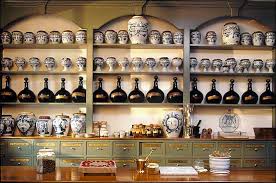
记忆方法
将“apothecary”分解为“apo-”(来自希腊语,意为“分开”、“去除”)和“-cary”(类似“carry”,意为“携带”)。记忆方法:想象一个古代的药剂师(apothecary)在分开和携带各种药草和药物,进行混合和调配。这种方法将单词的构成与其实际含义联系起来,有助于记忆。
以上内容由AI生成, 仅供参考和借鉴
中文词源
apothecary 药商
前缀apo-, 从,从...离开。词根thec, 放置,词源同单词do, 放置,做。指放商品的店铺,后特指药店。
英语词源
- apothecary
-
apothecary: [14] Originally, an apothecary was simply a shopkeeper – the word comes via Old French from late Latin apothēcārius, which was based on Greek apothékē ‘storehouse’ (source, via French, of boutique [18] and via Spanish of bodega [19]), a derivative of the verb apotithénai ‘put away’ (formed from the prefix apo- ‘away’ and the verb tithénai ‘put’ – source of thesis).
By the time the word entered English it was reserved to shopkeepers who sold non-perishable groceries, such as spices – and herbal and other remedies. Gradually, apothecaries began to specialize more and more in drugs, so that in 1617 a formal separation took place between the Apothecaries’ Company of London and the Grocers’ Company. Apothecary remained the general term for a ‘druggist’ until about 1800, when chemist began to take over.
=> bodega, boutique, thesis - apothecary (n.)
- mid-14c., "shopkeeper, especially one who stores, compounds, and sells medicaments," from Old French apotecaire (13c., Modern French apothicaire), from Late Latin apothecarius "storekeeper," from Latin apotheca "storehouse," from Greek apotheke "barn, storehouse," literally "a place where things are put away," from apo- "away" (see apo-) + tithenai "to put, to place" (see theme). Same root produced French boutique and Spanish bodega. Cognate compounds produced Sanskrit apadha- "concealment," Old Persian apadana- "palace."
Drugs and herbs being among the chief items of non-perishable goods, the meaning narrowed 17c. to "druggist" (Apothecaries' Company of London separated from the Grocers' in 1617). Apothecaries formerly were notorious for "the assumed gravity and affectation of knowledge generally put on by the gentlemen of this profession, who are commonly as superficial in their learning as they are pedantic in their language" [Francis Grose, "A Classical Dictionary of the Vulgar Tongue," 1796]. Hence, Apothecary's Latin, barbarously mangled, also known as Dog Latin.
权威例句
- 1. I am an apothecary of that hospital.
- 我是那家医院的一名药剂师.
- 2. He was the usual cut and dry apothecary, of no particular age and color.
- 他是那种再普通不过的行医者, 说不出多大年纪,相貌也没什么值得一提的.
- 3. Apothecary: The availability of medicines makes the isle more orderly.
- 药店: 有效的药品让岛上的人们感到有次序.
- 4. You can consult apothecary, they can tell you accurate result.
- 你可以去请教药剂师, 他们会告诉你准确答案的.
- 5. Yellow apothecary: Like, it is to like too simply!
- 黄药师: 喜欢啊, 简直是太喜欢了!
